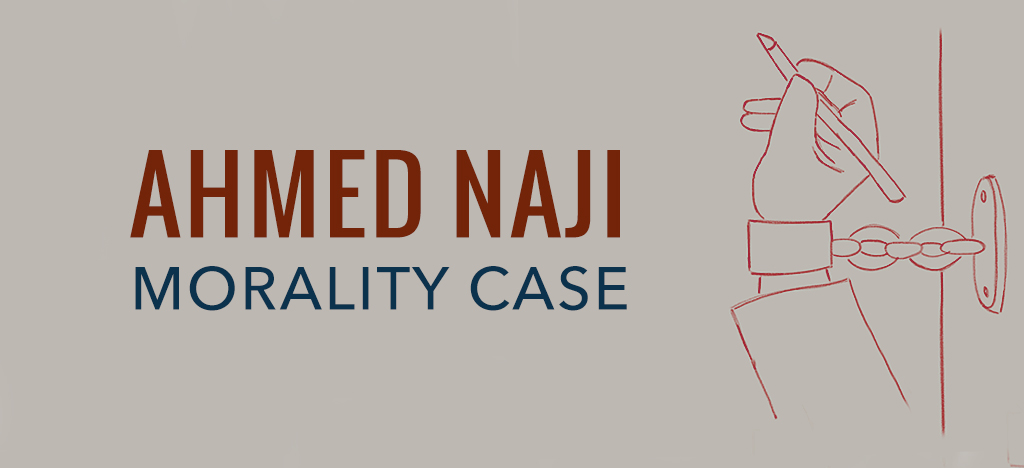The magnitude of the case of journalist and novelist Ahmed Naji was as odd as the two-year imprisonment verdict he received as a punishment for using sexually explicit language in his novel Using Life. The complainant went voluntarily and filed a complaint against Naji, claiming that he suffered from heart disorders and elevated blood pressure after reading a chapter of Naji’s novel that had been published in a newspaper. This nonsense moved on its bureaucratic track through an initial trial, which resulted in an acquittal, and a second trial where Naji received a two-year prison sentence and got transferred to Tora prison.
Naji’s trial is a reflection of the already-extant state of moral censorship practiced by the Egyptian society against its individuals, having escalated at the end of the Mubarak era. Egyptians working in Saudi Arabia acquired Wahhabi ideas and Salafist sheikhs broadcast sermons on satellite television and distributed audio recordings of the same.
Individuals in Egypt pay too much attention to the people surrounding them, and a segment of the Egyptian community has become dedicated to this issue. Doormen take note of comings and goings in apartment buildings as a sense of moral guardianship lends their work a kind of grandeur. Naji’s prosecutor similarly positioned himself as an arbiter of morality with a speech attacking authors and artists. “They thought that freedom –especially freedom of expression, requires thinking without any restrictions or limits, they shocked the humanity feelings and shook the highest values and standards of the society, claiming that they are reformers” said the prosecutor. “The defendant and his ilk want to destroy moral virtues.”
The prosecutor went on to draw the battle lines even more starkly. “The battle between us and these rags of the yellow press”—referring to Akhbar al-Adab, the paper that published an excerpt of Naji’s novel—“will not subside as long as newspapers are venues to violate morality.” The prosecutor and judge have made themselves responsible for protecting the ethics of the Egyptians by combating immorality cloaked as creativity.
This blurring of professional obligations, constitutional and legal rules, public opinion, and personal belief is a disaster that threatens the application of law. Cases are decided by personal morality, and judges and prosecutors can decide to target individuals for any reason—support for or opposition to the revolution, support for or opposition to the president, or any other cause.
In light of the constitution—adapted in 2014—Naji’s conviction is, frankly, an enigma. One judge, relying on the constitution’s promises of freedom of expression, found him innocent; another, resorting to extraconstitutional reasoning, found him deserving of jail time.
The first judge, Ehab al-Rahib, based his verdict on Article 67 of the Egyptian Constitution, which states, “Freedom of artistic and literary creation is guaranteed. The state shall undertake to promote art and literature, sponsor creators and protect their creations, and provide the necessary means of encouragement to achieve this end. No lawsuits may be initiated or filed to suspend or confiscate any artistic, literary, or intellectual work, or against their creators except through the public prosecution. No punishments of custodial sanction may be imposed for crimes committed because of the public nature of the artistic, literal or intellectual product. …” This constitutional article forbids imprisonment verdicts based on publishing any artistic and literary creation, which is the basis of the case against Naji. The second judge absolutely should have taken this article into consideration.
Al-Rahib wrote in his opinion, “Freedom of expression and interaction of views related to it cannot be restricted, either by imposing prior restrictions on publication, or by subsequent harsh punishment. Citizens should have the freedom to access any literary work, without any restrictions on their thoughts and ideas. Expressing ideas, opinions, and beliefs publicly makes them materials for research and evaluation not only by specialists but also the whole society, and give them a chance to embrace what they think is good and reject the bad.”
We have here a judge who fully understands and is aware of the principles of freedom of creativity, their positive effect on society and its development, and the importance of protecting them. He went on to defend the idea of including sexual material in literary works, saying, “In the past, the ideas, views and assumptions of scientists and intellectuals, were criticized and rejected by society, but now such ideas are considered as scientific facts and literary creations that enrich our society.”
Egypt is puzzling out the governing rules for its complicated issues. The country is facing a disaster, as writers and researchers like Islam al-Behairy and Fatima Naoot are either in jail or facing charges related to blasphemy and libel. Egypt is in an environment which suffers from restrictions on politics and the expansion of government control over political actions, publishing, and general creativity as never before. This raises major questions about the fate of the constitution, which the vast majority of Egyptians voted for at the state’s urging in 2014. This constitution has many important articles that are inactive and frozen, either deliberately or through the habit of ignoring them.
